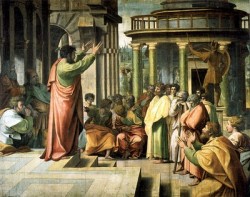
Be sure to read Part 1 and Part 2.
Continuing our walk through the book of Acts, we can note the following similarities between what happened to Jesus in the Gospel of Luke and what happens in the life of the Church in Acts.
A centurion. . .
A centurion, well-spoken of by the Jews, sends servants to Jesus to ask him to come to his house (Luke 7:1–10).
A centurion, well-spoken of by the Jewish people, sends men to Peter, asking him to come to his house (Acts 10).
Stories featuring Widows and Resurrection
In Luke 7 we have a narrative which involves a widow and a resurrection (cf. Luke 7:11–17). Jesus raises the dead, saying, “Arise.” Upon doing this we read that the dead man “sat up”.
The narrative in Acts 9 involves widows and, again, a resurrection (Acts 9:36-43). The details of the story are also similar. Peter says, “Rise.” The dead woman then “sat up”
Criticism from Jewish Leaders
Jesus is criticized by a Pharisee for being touched by a sinful woman (Luke 7:36-50).
In Acts, the circumcision party criticizes Jesus for his association with Gentiles (Acts 11:10–13).
Journey to Jerusalem
In Luke, Jesus journeys to Jerusalem, which is ultimately to end with his passion (9:31; 9:51; 12:50; 13:33; 18:31-33), doing so under divine necessity (13:33). Throughout the journey the disciples’ lack of understanding is underscored (14:45; 18:34). This “way” motif—i.e., the way to Jerusalem—is mentioned seven times (Luke 9:51; 13:22; 13:33; 17:11;18:31; 19:11; 19:28).
In Acts, Paul journeys to Jerusalem, which is also a kind of “passion-journey” (20:3; 20:22-24; 20:37-38; 21:4; 21:10-11; 21:13) that he undertakes under divine necessity (20:22; 21:14). The trip is marked by his friends’ lack of understanding (21:4, 21:12-13). Acts mentions Paul’s trip to Jerusalem seven times (Acts 19:21; 20:22; 21:4; 21:11-12; 21:13;21:15; 21:17).
As Talbert observes, not only is Paul’s journey to Jerusalem similar to Jesus’, there are also striking parallels in the descriptions of what happened to them when they arrived there. These similarities are too uncanny to be written off as coincidence or insignificant. We shall touch on these below.
Welcomed at Jerusalem
Jesus is welcomed by the people at Jerusalem, who praise God for his works (Luke 19:3).
Paul is welcomed and they glorify God for the things being done through him (Acts 21:17–20a).
A Temple Visit
Jesus goes into the temple (Luke 19:45–48).
Paul goes into the temple (Acts 21:26).
Opposed by Sadducees, Acknowledged by Scribes
The Sadducees, who do not believe in the resurrection, oppose Jesus. Some scribes take a friendly attitude to Jesus (Luke 20:27–39).
The Sadducees do not believe in the resurrection oppose Paul. Some scribes say they find nothing wrong with Paul’s teaching (Acts 23:6–9).
Breaking Bread
“[Jesus] he took bread, and when he had given thanks he broke it and gave it to them. . .” (Luke 22:19).
“[Paul] took bread, and giving thanks to God. . . broke it and began to eat” (Acts 27:35).
Seized by a Crowd
A crowd seizes Jesus (Luke 22:54).
The people ran together; they seized Paul (Acts 21:30).
Slapped by the High Priest’s Assistants
Jesus is slapped by the priest’s assistants (Luke 22:63–64).
Paul is slapped at the high priest’s command (Acts 23:2).
The Four Trials of Jesus and Paul
Jesus stands on “trial” four times (i.e., before the high priest and the council; Pilate; Herod; Pilate)(Luke 22:54; 23:1; 23:9; Luke 23:11).
In Acts, Paul stands on “trial” four times (Sanhedrin; Felix; Festus; Agrippa)(Acts 23; 24; 25; 26).
Thrice Declared Innocent by Gentile Authority
Pilate declares Jesus innocent three times (Luke 23:4, 14, 22).
Three times the pagan rulers (the king, the governor and Bernice; Festus; and Agrippa) declare Paul innocent (Acts 23:9; 25:25; 26:31).
Before Herod
Pilate sends Jesus to Herod for questioning (Luke 23:6-12).
Herod hears Paul with permission of Festus (Acts 25:13-26:32).
Rulers set to Release
Pilate says he will release Jesus (Luke 23:16, 22).
Agrippa says: “This man could have been set free” (Acts 26:32).
To be continued. . .


